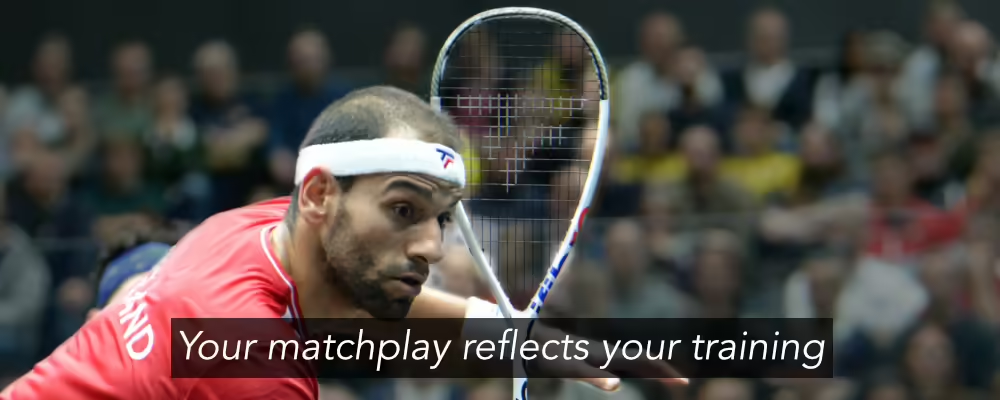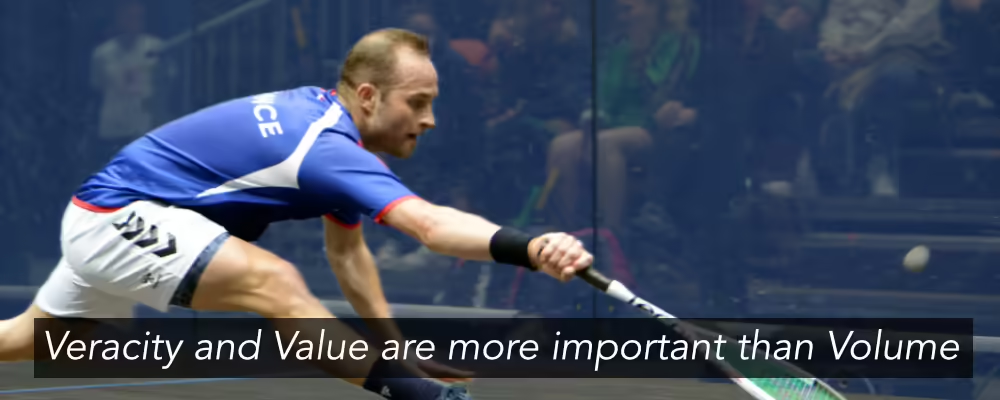08 January 2024 / 7-Min Read / Translate
There are a lot of different ways of looking at training and for amateur squash players, finding the right balance AKA Goldilocks Squash can seem difficult. So let's look at one way to view your training that will help you decide what to do and what not to do.
As you have seen from the title, I will address each aspect; volume, velocity, veracity, variety and value, in turn and finish with a key point for you to consider.
This article is based on a video I made, which is embedded at the bottom of this page.

I have said this many times in the past and I am sure I will say it many times in the future: More training is not better. Your body needs rest. Your objective is to find the right amount of training. A lot depends on how much free time you have, how motivated/disciplined you are and other personal details. As a general guide if you are dreading your training for more than a week, then you are probably training too much.
We need a little dread before training otherwise the training is too easy, but you are not a pro. Training should bring positive feelings not negative ones. In addition, feeling physically tired BEFORE training sessions is NOT a good sign. Listening to your body is absolutely vital and in all honesty, I personally find that aspect very difficult. That internal mental conversation I used to have with myself before getting ready for training. Was I being lazy by thinking about reducing the amount of training today or was I being sensible and truly listening to my body?
It's also worth noting that after training for a month or two, if we haven't seen as big an improvement as we had hoped for, it's natural to want to train more, thinking we are not doing enough. That's not necessarily the right approach.
Key Point:
More is not always better. You should look forward to training, not dread it. You should be fresh for each session, and if you are not then perhaps you should adjust that day's training schedule to better suit how you feel. Final thought: over-training is much worse than under-training.
This is partly how fast you do something and partly how intensely you do it. Ideally, unless you have been told by a sports-training professional or you are lifting heavy weights, the speed/intensity at which you train should reflect the speed/intensity at which you play. Let's use ghosting as the example. You would ghost for two reasons: one to improve the quality of your footwork and two to improve your fitness. When focusing on footwork, you would start ghosting slower than in real matches so that you can ensure your footwork is performed properly. Just like any technical aspect, you start slow and build up the speed as you improve.
Fitness ghosting is high-intensity, short bursts. Your objective is to recreate a real rally. Almost certainly the "quality" of your footwork will be below you best, but that's fine for fitness ghosting. Now consider some strengthening exercises, perhaps squats or lunges. You these are new to you or you are using weights, start slowly. Yes, when you lunge in squash it is at high speed, but you don't do it with weights!
Be careful of the phrase or concept of "always giving 110%!". Lower intensity has a place in all types of training and it's not necessarily an easy day - it might be a smart day.
Key Point:
Adjusting the velocity and intensity of your training can ensure you minimise the chances of injury, but also allow you to focus on different aspects of the exercise itself.
Veracity is truth. In this case truth is quality. Never cheat in your training. What I am asking you to do here, is always train properly. No shortcuts or no losing focus. An example of this would be that if you were performing a drill and you notice the quality of swing or shot starts to drop - stop. Better to have less time but higher quality than longer time and lower quality - at least for technical exercises. A technical exercise is one where technique matters.
I am not saying that you can't have easy days or light training sessions, I am saying that when quality matters, don't compromise.
Key Point:
When performing technical exercises or drills, if you can't keep the quality of that exercise high, take a break and come back to it. In fact, that's at the core of my solo routines. Shorter times, higher intensities and a focus on quality over quantity.
In the past, ambitious squash players spent 95% of their training time on a squash court. That's no longer true. Not only was that bad for the long-term health of those players due to repetitive strain injuries, it also wasn't maximising their training time. Nowadays, the list of possible exercises is huge. Examples include dancing, yoga, pilates, swimming, BJJ, specific-strength training, running, cycling, rowing, HIIT, crossfit etc etc. Limiting yourself to just playing squash is not a good idea.
There is a phrase in English: "A change is as good as a rest". So if you are feeling a little tired with your current training schedule: change it. Get off the court and try some outside exercise if that is possible for your personal circumstances. Being very fit for one sport doesn't mean you are fit for other sports.
Yes, you still need to recognise that ultimately, you focus is squash, but that doesn't mean you should only train on a squash court.
Key Point:
There's no denying that squash can be hard on the body. Our knees hips and back do a lot of work when playing. Think long-term and get off the court to ensure your body can rest, but also improve other aspects of your fitness.

Ask yourself this: Is this training valuable for me? What I mean is that there are plenty of great exercises you can do, both technical and purely physical, but do they help YOU become a better squash player? For example, you have great cardio fitness, so you do lots of cardio. You do that because we all enjoy working on our strengths. But doing plenty of cardio when you already have high cardio fitness is probably not the best use of your training time.
You need to train your weaknesses not your strengths. About 70/80% of your training time should be spent on your weaknesses. The problem is that most amateurs don't have the discipline to make the hard choices. They choose the "fun" option, which mostly consists of playing instead of performing condition games or getting on the bike, instead of lifting some weights.
We are all guilty of that thinking, but it's important to not let it control of training schedules for too long. You might argue that you need to ensure your strengths stay your strengths so you "have to" train them. Yes, you do need to ensure they are not forgotten, but let's be honest, once you get good at something, the amount iof time needed to maintain it is much less than to get it to a strength.
Key Point:
Be ruthless and disciplined. Select the exercises or training that will bring you the most benefit, not just the easy, fun things, but the things you NEED to do. Apply the NEED or LIKE thinking to each training option. Choose NEED more than LIKE.
I know I haven't given you very specific training plans. I know that you want that. BUT, you have to accept that YOU control your squash future. Use the principles I have described above to find the right combination of volume, velocity, veracity, variety and value for YOU.
Better to under-train than over-train. Train at the right intensity for the exercise you are doing, If you are doing ANYTHING that requires technique, never cheat. Try different exercises to keep your motivation. high and avoid injury. Do what you NEED to do, not just what you LIKE to do.
As always, if you would like to share your thoughts with me about this article, please send me an email and we can talk.